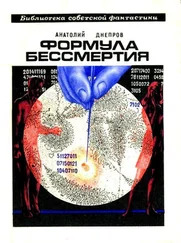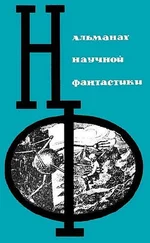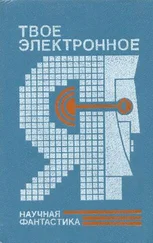Анатолий Днепров - Crabs on the island
Здесь есть возможность читать онлайн «Анатолий Днепров - Crabs on the island» весь текст электронной книги совершенно бесплатно (целиком полную версию без сокращений). В некоторых случаях можно слушать аудио, скачать через торрент в формате fb2 и присутствует краткое содержание. Город: Moscow, Год выпуска: 1968, Издательство: MIR Publishers, Жанр: Фантастика и фэнтези, на английском языке. Описание произведения, (предисловие) а так же отзывы посетителей доступны на портале библиотеки ЛибКат.
- Название:Crabs on the island
- Автор:
- Издательство:MIR Publishers
- Жанр:
- Год:1968
- Город:Moscow
- ISBN:нет данных
- Рейтинг книги:4 / 5. Голосов: 1
-
Избранное:Добавить в избранное
- Отзывы:
-
Ваша оценка:
- 80
- 1
- 2
- 3
- 4
- 5
Crabs on the island: краткое содержание, описание и аннотация
Предлагаем к чтению аннотацию, описание, краткое содержание или предисловие (зависит от того, что написал сам автор книги «Crabs on the island»). Если вы не нашли необходимую информацию о книге — напишите в комментариях, мы постараемся отыскать её.
Crabs on the island — читать онлайн бесплатно полную книгу (весь текст) целиком
Ниже представлен текст книги, разбитый по страницам. Система сохранения места последней прочитанной страницы, позволяет с удобством читать онлайн бесплатно книгу «Crabs on the island», без необходимости каждый раз заново искать на чём Вы остановились. Поставьте закладку, и сможете в любой момент перейти на страницу, на которой закончили чтение.
Интервал:
Закладка:
"For God's sake, Cockling, tell me-what are we going to do with it? Why have we come here?" He got up, came over me, and said in tones that were now serious. "To test Darwin's theory."
"But that's a biological theory, a theory of natural selection, evolution, and so on..," I muttered.
"Exactly. Now look, our hero's gone to get a drink."
I was astounded. The toy had crawled up to the water's edge and, lowering its proboscis, was quite evidently drinking. Having sucked up its fill, it crawled back into the sunshine and stopped motionless.
I stared at the little machine and was conscious of a strange feeling of revulsion, mingled with fear, toward it. For an instant the clumsy toy crab reminded me somehow of Cookling himself.
"Did you invent it?" I asked the engineer after a pause.
"Uhuh," he mumbled, and stretched himself out on the sand.
I lay down too and watched the strange machine in silence. It seemed now to be quite lifeless.
I crawled over to it on my belly and began to scrutinize it.
The crab's back could be described as a semi-cylinder with flat depression's in front and behind. In each of these there were two openings resembling eyes. This impression was strengthened by the fact that the gleam of crystals deep in the interior could be seen through them. Underneath there was a flat surface for a belly. From just above this platform three pairs of large jointed pincers and two pairs of small ones protruded. I was unable to see inside the crab.
As I looked at the toy, I tried to understand why the Admiralty should attach so much importance to it that it had equipped a special ship for the expedition to the island.
Cookling and I lay on the sand until the sun had sunk so low on the horizon that the shadow cast by the bushes growing some distance away fell on the metal crab. As soon as this happened, it moved slightly and crawled out again into the sunlight. But the shadow overtook it and then our crab started crawling along the shore, coming closer and closer to the water, which was still lit by the sun. The warmth of the sun's rays was quite indispensable to it, it seemed.
We got to our feet and slowly followed the machine.
In this way we gradually circled the island, until we finally came to its western shore.
There, almost at the water's edge, lay one of the heaps of metal. When the crab got within some ten paces of the heap, it suddenly made a rush for it as if it had forgotten all about the sun and stopped dead by one of the copper bars.
Cookling touched my arm. "Let's get back to the tent now," he said. "We'll see something interesting tomorrow morning."
We ate our supper in silence in the tent and then wrapped ourselves in light flannel blankets. It seemed to me that Cookling was pleased that I hadn't asked him any questions. Before falling asleep, I heard him tossing from side to side and chuckling now and again, which meant he knew something nobody else did.
Early next morning I went for a bathe. The water was warm and I had a long swim, enjoying the sight, to the east, of the crimson rays of the sun just rising above the water whose mirror-like surface was scarcely ruffled by the long slow swell. When I returned and entered the tent, the engineer was no longer there.
"Gone to feast his eyes on his mechanical monster," I thought, and opened a tin of pineapple.
But I had no more than swallowed three slices when I heard his voice, from a distance at first, and then getting louder and louder. "Lieutenant, come here quick!" he was shouting. "It's begun! Hurry! Run quick!"
I went out of the tent and saw Cookling standing among the bushes on a hillock and waving to me.
"Come on," he said, puffing like a steam engine. "Be quick!"
"Where to?"
"Where we left our little beauty yesterday."
The sun was already high in the sky when, running all the way, we reached the heap of metal. The ingots were shining so brightly I could make out nothing at first.
It was only when we were a couple of steps away that I noticed two thin streams of bluish smoke rising above the heap, and then-I stopped as if paralysed. I rubbed my eyes, but the apparition did not vanish. By the heap of metal stood two crabs, exactly like the one we had unpacked yesterday.
"Could one of them have been buried in that heap of scrap?" I exclaimed.
Cookling doubled up several times, chuckling and rubbing his hands.
"Stop playing the fool!" I shouted. "Where did the second crab come from?"
"It was born! It was born last night."
I bit my lip and without saying a word went right up to the crabs, above whose backs the thin wisps of smoke were rising. At first I thought I was suffering from hallucinations: both crabs were hard at work!
Exactly, they were at work, their slender front tentacles moving rapidly up and down. The tentacles were in contact with the bars and, producing an electric arc on their surface, as in electric welding, they were cutting off bits of metal. The crabs quickly pushed the metal into their wide mouths. Inside these mechanical creatures could be heard a humming noise. At times a shower of hissing sparks was ejected from their mouths, and then the second pair of tentacles extracted finished components.
These components were put together in definite order on a little flat platform that gradually moved out from under the crab.
An almost complete copy of a third crab had been created on the platform of one of the crabs, while only the outlines of one had appeared on that of the other. I was astounded by the sight.
"But these awful things are creating others in their own image!" I exclaimed.
"Quite so. The whole purpose of this machine is to create machines in its own image," said Cockling.
"But is that possible?" I asked, in utter perplexity.
"Why not? Any machine tool, a lathe, for example, makes parts for lathes like itself. So I conceived the notion of making an automatic machine that would manufacture copies of itself from start to finish. My crab is the model of such a machine."
I thought over the engineer's words, trying to grasp their import. Just then the first crab's mouth opened and a wide ribbon of metal issued from it, covering the entire mechanism on the platform and thus forming the back of the third automaton. When the back was properly in place, the nimble front legs welded on metal ends with openings at front and back, and the new crab was ready. As with its brothers, one could see the gleam of a metal mirror with a red crystal in the depression on its back.
The crab manufacturer pulled the platform in under its belly and its "baby" got down on to the sand. I noted how the mirror on its back began slowly to turn toward the sun. After a while, the crab crawled to the water's edge and had a drink. Then it crawled into the sunshine and stood motionless, warming itself. I thought I was dreaming.
As I watched the new-born creature, I heard Cockling say: "And here's the fourth."
A turned my head and saw that a fourth crab had been born. The first two, quite unconcerned, continued to stand by the heap of metal, cutting off bits and shoving them inside them-repeating what they had done before.
The fourth crab also went for a drink of sea-water.
"Why the hell do they swill water?" I demanded.
"They're filling the battery. While the sun shines, its energy is transformed into electricity by means of the mirror on their back and a silicon battery. It's enough for all their day-time work and to charge the accumulator. At night the robot is fed by the power stored in the accumulator."
"So these creatures work day and night?"
"Yes, day and night, without a break."
The third crab stirred and crawled over to the heap of metal. Now three robots were working, while the fourth was charging itself with solar energy.
Читать дальшеИнтервал:
Закладка:
Похожие книги на «Crabs on the island»
Представляем Вашему вниманию похожие книги на «Crabs on the island» списком для выбора. Мы отобрали схожую по названию и смыслу литературу в надежде предоставить читателям больше вариантов отыскать новые, интересные, ещё непрочитанные произведения.
Обсуждение, отзывы о книге «Crabs on the island» и просто собственные мнения читателей. Оставьте ваши комментарии, напишите, что Вы думаете о произведении, его смысле или главных героях. Укажите что конкретно понравилось, а что нет, и почему Вы так считаете.






